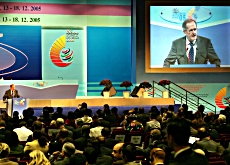
Compromise reached in Hong Kong

Ministers from World Trade Organization (WTO) states, including Switzerland's Joseph Deiss, have approved a text that eliminates farm export subsidies by 2013.
But although the Swiss economics minister talked of success, others were less enthusiastic about the modest levels of progress achieved.
“We are satisfied that a text exists and that we have achieved a result,” declared Deiss on Sunday. “We’re leaving with more than we brought – which makes Hong Kong a success.”
The trade agreement, which brings a binding global trade treaty one step closer, eliminates farm export subsidies by 2013 and makes modest cuts in other trade barriers, while leaving many contentious issues for later.
All 149 WTO member states endorsed a final agreement text after six days of talks that sometimes appeared on the verge of collapse and saw violent confrontations between protesters and police.
The agreement falls far short of the ambitious deal that WTO negotiators had originally hoped for from Hong Kong: a detailed set of formulas for cutting farm and industrial tariffs and subsidies.
Towards that end, the text set April 30, 2006, as a new deadline to work out those details, required if the WTO is to set a global trade treaty by the end of next year.
Deiss added that the agreement was “an excellent basis to build on in the future” and that he was “confident” that it would be concluded on schedule.
Development package
The 2013 date was a key demand of the European Union, which faced intense pressure from Brazil and other developing nations to end agricultural export subsidies by 2010.
But in a compromise, the text included a provision that a substantial part of the subsidies would go by “the first half of the implementation period” – suggesting that a timeframe would be set later.
However, the Swiss delegation deplored the lack of progress on geographical indications, names or signs used on certain products which correspond to a specific geographical location or origin.
But it acknowledged that a certain amount of progress had been made regarding goods and services.
Concerning the “development package”, developed countries have committed themselves from 2008 to importing – without customs legislation or quotas – 97 per cent of products from the least advanced nations.
Frankly feeble
“The ministers have managed to reach an agreement and that’s good,” said Gregor Kuendig from the Swiss Business Federation, economiesuisse. “The text is rather modest, but we probably couldn’t have expected more.”
Kuendig added that regarding those subjects that Switzerland held most dear – non-agricultural products, the facilitation of commerce and services – at least they now had a text agreed at ministerial level.
John Dupraz, vice-president of the Swiss Farmers’ Union, regretted the many hours devoted to agreeing on 2013, saying the principle was accepted a decade ago.
After the fifth ministerial conference in Cancún, Mexico, collapsed in stalemate in 2003, the WTO hammered out in Geneva a package of non-binding “framework agreements” signed on July 31, 2004.
“This is what’s making us lose sight of what’s really at stake,” he said. “On the vital issues – market access or capping [putting a limit on customs duty] – nothing has been settled.”
The non-governmental organisations were more critical. “After 18 months of work, the progress is frankly feeble,” said Michel Egger from the Swiss Alliance of Development Organisations.
swissinfo, Pierre-François Besson in Hong Kong
The sixth ministerial conference of the WTO took place from December 13 to 18 in Hong Kong.
The meeting of the organisation’s highest decision-making was intended to lead to the conclusion of the so-called Doha round of trade talks, launched in 2001.
Economics Minister Joseph Deiss led the Swiss delegation and hailed the meeting a success.
Ministers have approved a text that eliminates farm export subsidies by 2013.
Developed countries have committed themselves from 2008 to importing – without customs legislation or quotas – 97 per cent of products from the least advanced nations.

In compliance with the JTI standards
More: SWI swissinfo.ch certified by the Journalism Trust Initiative















![The four-metre-long painting "Sonntag der Bergbauern" [Sunday of the Mountain Farmers, 1923-24/26] had to be removed by a crane from the German Chancellery in Berlin for the exhibition in Bern.](https://www.swissinfo.ch/content/wp-content/uploads/sites/13/2025/12/01_Pressebild_KirchnerxKirchner.jpg?ver=a45b19f3)













You can find an overview of ongoing debates with our journalists here . Please join us!
If you want to start a conversation about a topic raised in this article or want to report factual errors, email us at english@swissinfo.ch.